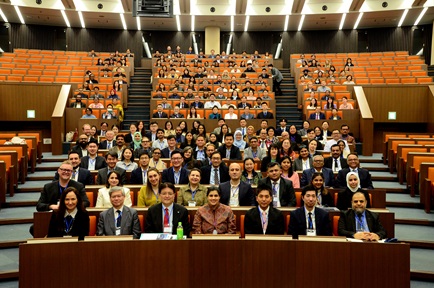High demand for MBAs but do you really need one?
Business schools are seeing a surge in applications on the back of a cooling job market
APPLICATIONS to Master of Business Administration (MBA) programmes rose to the highest in five years in 2024 amid a slowing economy and an uncertain labour market.
More students now see value in business school as a stepping stone, with candidates hoping to get an edge or make a career pivot, say industry watchers. Linda Teo, country manager for employment agency ManpowerGroup Singapore, points out that individuals are finding ways to “stay relevant for the future of work”.
The number of global layoffs over the past few years has only increased the urgency – in 2024, several large companies including Dyson, Ninja Van, PropertyGuru and Lazada announced job cuts. Naturally, concerns over job prospects could be an additional factor driving some back to school.
Yet, enrolling for an MBA also requires deep pockets. A student attending Harvard Business School’s two-year programme, for instance, would likely be paying over US$200,000, including housing, food, transportation and other living expenses.
So even as business schools continue to produce record numbers of MBA graduates, the big question remains whether pursuing one remains a worthy investment in today’s economy, considering the hefty price tag.
Surge in applications
According to a survey conducted by the Graduate Management Admission Council (GMAC) in which 297 business schools across 40 countries participated, MBA applications rose 13.2 per cent in 2024 from a year ago, following two consecutive years of decline.
The increase was larger than the 3.8 per cent bump in 2021 after the Covid-19 pandemic, GMAC data in October showed.
A similar trend can be observed across top MBA programmes, with Harvard Business School receiving 9,856 applications in 2024, a 20.9 per cent increase from 8,149 in 2023. Likewise, 7,322 students applied for the Wharton School of the University of Pennsylvania’s MBA programme in 2024, up 15.9 per cent from 6,319 a year ago.
Meanwhile, Singaporean universities continue to record stable or rising application rates.
Application figures have “remained consistent over the years” at the National University of Singapore (NUS), which was ranked third in Asia by the Financial Times’ (FT) Global MBA Rankings in 2024. A university spokesman said there was “increased interest from candidates around the region”.
Professor Jun Yang, dean of Nanyang Business School and President’s Chair in Finance at the Nanyang Technological University (NTU), said there were 400 applications to its MBA programme in 2024, up from 320 in 2023.
Professor Jun Yang, dean of Nanyang Business School and President’s Chair in Finance at the NTU, says there were 400 applications to its MBA programme in 2024, up from 320 in 2023.
Dr Ang Ser Keng, academic director of the Singapore Management University’s (SMU) MBA, said applications for its MBA programme have been “holding steady” over the past five years.
There are many reasons for the rising interest in MBAs.
ManpowerGroup’s Teo notes that the shift towards remote and hybrid work models, coupled with the increasing complexity of the global business landscape and the adoption of new technology, has motivated many individuals to pursue an MBA to stay relevant.
The increased flexibility offered by many institutions, including online and part-time options, has made MBAs more accessible, says David Blasco, country director of recruitment agency Randstad Singapore.
He adds: “MBA programmes equip students with a versatile skill set including strategic thinking, financial analysis, leadership, project management and cross-cultural communication, making (them) attractive and adaptable candidates for diverse global opportunities.”
How MBAs add value
Certain industries may have a stronger preference for candidates with MBAs, says ManpowerGroup’s Teo. Companies in management consulting, tech and finance tend to hire the most MBAs. Employers also often prefer MBA graduates for senior corporate finance positions.
“Many MBA programmes also have a global focus, providing students with exposure to different cultures, business practices and economic environments, which can be advantageous in today’s interconnected world,” she adds.
Saumitra Chand, a career expert at employment portal Indeed, says that as at September 2024, around 17 per cent of job listings on its platform highlight an MBA as either a requirement or a “good-to-have”.
He says: “This figure marks a notable demand in roles needing advanced qualifications, especially in fields where leadership, strategic thinking and analytical skills are key.”
Despite these benefits, an MBA can be a significant financial commitment.
For instance, it costs US$76,410 to enrol in Harvard Business School for the current academic year, and the total expenses of completing the two-year programme will likely run over US$200,000.
The Wharton MBA, which topped FT’s rankings in 2024, is expected to cost US$254,432 for the 2024 intake, according to the university’s website.
Enrollment fees for local universities are similarly costly.
The upcoming cohort of students enrolling in the NUS MBA programme will be paying S$99,190 in tuition fees. NTU’s Nanyang MBA offered by the Nanyang Technological University costs S$81,750, and SMU’s January intake students will pay S$76,300 in fees.
Students can take up scholarships or fellowships to lower these costs, but checks by BT showed that full scholarships for MBA programmes are uncommon for both local and overseas programmes.
Students can also take bank loans such as the OCBC Education Loan and the POSB Further Study Assist to fund their studies.
Kenneth Tan, OCBC’s head of portfolio and lending management, says: “While pursuing higher education is a good investment for most people, we advise our customers to do so prudently. Besides the cost of tuition, they should also factor in other expenses including programme materials, housing, transport and health insurance if they are going abroad. They should be confident about whether their future career can put them on the path to repaying the loan comfortably.”
Value for money?
Despite the high tuition fees, MBAs carry significant appeal due to the prospect of increased earnings post-graduation.
According to the FT’s latest MBA rankings, NUS MBA graduates had a weighted annual salary three years after graduation of US$165,973, a 170 per cent increase from pre-graduation.
Insead, which has a campus in Singapore and was ranked second globally by FT in 2024, reported a 110 per cent increase in weighted salary of US$198,904.
However, Randstad’s Blasco cautions that MBA graduates, unlike other college graduates, typically possess extensive professional experience, making their starting salaries heavily dependent on their background.
He says: “While an MBA from top institutions like NUS, SMU, and NTU can lead to higher starting salaries, having one is not a guarantee of increased pay in today’s job market.”
Blasco further points out that the value of an MBA lies in its networking opportunities and the ability to apply the acquired skills and knowledge in the real world, which are key factors that lead to potential career advancement and higher earnings over time.
He notes that company-sponsored MBA candidates often enjoy a strategic advantage in their career progression because they are typically identified as high-potential employees and are groomed for leadership roles. Often, a bond is attached to the sponsorship.
“The sponsorship itself indicates the company’s investment in their future, which can translate to faster promotions and salary growth post-MBA,” he says.
While an MBA from a top university can cost hundreds of thousands of dollars, David Yin, a partner at GSR Ventures who attended the Stanford Graduate School of Business (GSB), says the diverse networking opportunities justify the cost.
David Yin, a partner at GSR Ventures who attended the Stanford Graduate School of Business.
“Everyone you meet in the programme is similar in the sense that they are ambitious and business-minded, but everyone is different in terms of the geographies or industries they come from. This becomes incredibly helpful.”
For instance, while conducting due diligence on a fintech company in Mexico in his current role, Yin benefited from insights shared by a Stanford GSB alumnus based in Latin America who worked in a similar function.
An MBA may also lead to rare opportunities such as joining a unicorn startup, and it is not unheard of for fresh MBA graduates to command annual salaries in the US$250,000 range in certain industries such as finance, Yin says.
Many MBA students are also able to transition into roles across diverse sectors post-graduation.
Twenty-six per cent of students from the NUS MBA Class of 2022 found jobs in the technology sector; 21 per cent were employed in consulting and 17 per cent in financial services. NUS MBA students who had worked in the public sector were able to pivot to financial services and consulting, while those who worked in real estate managed to switch to roles in tech, for instance.
Based on data collated over the last five years, 96 per cent of Nanyang MBA graduates pivoted to a new industry, function or location, says NTU’s Yang.
The top five sectors employing SMU MBA graduates are financial services, technology, manufacturing, consulting, and media and advertising.
According to Insead’s latest employment statistics from the Classes of 2023, 44 per cent of graduates who joined management consulting firms were new hires, while 17 per cent returned to their organisations after graduation.
Opening new doors
Randstad’s Blasco believes that an MBA can be a powerful tool for changing jobs and assessing opportunities globally.
“Many programmes have strong relationships with multinational companies and offer international internships or exchange programmes, opening doors to global opportunities,” he notes.
The increased flexibility offered by many institutions, including online and part-time options, has made MBAs more accessible, says David Blasco, country director of recruitment agency Randstad Singapore.
An MBA student who spoke to The Business Times on condition of anonymity says: “It’s generally easier to find employment in a country if you have studied there previously. You have stronger ties to the geography so it signals stronger commitment to employers, and internships (help) build a relationship with your future employer.”
Most MBAs in the US offer an optional practice training period, which gives students one year to stay on in the country post-graduation to find a job. For some schools, this can be up to three years, if the programme has a focus on science, technology, engineering and mathematics subjects.
Pursuing an MBA may also help graduates gain access to jobs in economic hubs. Those attending Stanford University, for instance, have the advantage of being in the heart of Silicon Valley.
Yin says: “Most jobs recruit in a very localised way. The people you meet on a day-to-day basis may be looking for a job and it happens organically. Whereas if you are based overseas, you may have to engineer your way to a job by meeting up with a lot of people in the area.”
However, while a lot of people may see the MBA as a way to pivot in their career, there may be “faster and smarter” ways of doing so, says Jennifer Ong, founder and career coach at Ctrl Alt Career.
“You may have to hustle a little bit, you may have to network a bit more and be more proactive in acquiring the skill sets yourself, but I think it’s very doable without going back to business school. It might be faster than taking two years and spending US$200,000.” For instance, she points out that there are courses on financial modelling or case interview prep resources available online.
She adds: “Be deliberate about what it is that you are trying to get out of business school and see if you can create that for yourself without going (there).”
“Business school doesn’t help you find a job you love because that requires actually figuring out what you want.”
ManpowerGroup’s Teo says that the key for non-MBA candidates applying for roles that list an MBA as a “good-to-have” is to highlight relevant experience and skills that align with the job requirements.
For instance, if the role requires strategic problem-solving, drawing insights from data, and a strong foundation in finance, a candidate can highlight these skills on their resume and link them to the job they’re applying for to make a strong case even without an MBA.
“Embarking on an MBA programme involves significant time, monetary commitment, and potential stress. Before enrolling into a program, consider whether the MBA aligns with short-term and long-term aspirations, (the availability of) alternative specialised certifications, and the potential financial benefits versus the costs.”
Lee Ling Xiang, principal consultant of sales and marketing at Robert Walters Singapore, says: “Most clients prioritise the relevance of the experience and also past work experience that an individual has, as compared to whether an individual holds an MBA.”
Industry watchers generally concur that an MBA can be a good investment in one’s career, especially as job-seekers face technological disruptions and economic uncertainty.
The knowledge, skills, network and credibility an MBA provides can give job-seekers an advantage over their peers, but these will have to be weighed against the high financial and opportunity costs.
Those seeking to work overseas or change careers stand to benefit greatly from joining an MBA programme, but candidates should bear in mind that there are other avenues for professional growth and career success than just jumping straight into business school.
Professor Jun Yang is the Dean of Nanyang Business School and President’s Chair in Finance at the Nanyang Technological University (NTU).
Source: The Business Times







